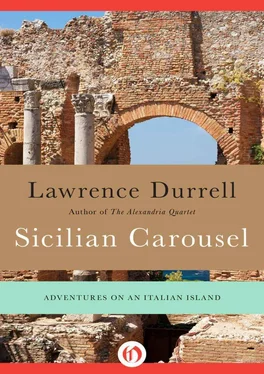But he was the complete master of his subject and in that hot afternoon light, westering now, he gave an expressive account of these once beautiful monuments which now lie, shorn of all decoration, unprotected by shade and stripped of all statuary. It is hard work, too, to try and visualize the great altar as it once must have been. All the statues have vanished and also the pillars. But even if they had survived they would presumably have been like those in the existing Sicilian temples — stripped of their false marble surfaces and now the color of dry tobacco. “I suppose it is silly to regret the wholesale destruction of fine objects as one culture succeeds another; after all, if nothing ever got destroyed where the devil would we put everything?” The musings of Deeds as we sat in the hot Roman amphitheater, chewing blades of grass and smelling the rich resinous smell of the hot pines which instantly brought to my memory the slopes of Acropolis or Lycabettos where as a young man I so often slept out on warm windless summer nights, brilliant with star fall. It must be the same here.
But the guide was harping on our good luck to have the Roman and Greek cultural world set side by side in Sicily as nowhere else. “The very architectural shape will tell you of two different predispositions. In this great amphitheater the Romans were organizing for the eye, for a show , a public show. Now just a few yards away you have the Greek hemicircle, organized in a different age for the ear . The difference between art as a quasi-religious intellectual event and a popular spectacle. Aeschylus and his Gods against bread and circuses. Here you can study both predispositions as if they were historically coexistent while in fact they are separated by centuries.” It was astute and highly suggestive as a way of looking at these now shadowy monuments of a lost world. The heat of the declining sun still throbbed, the rocks were dazing. Capers grew in the white rock as they did in Athens. There was even a little owl which flew into a cypress tree with the unmistakable melancholy little whoop of the skops . But what is astonishing is the speed with which the exact nature and function of things becomes forgotten; the archaeologist tries to read a sort of palimpsest of superimposed cultures, one displacing or deforming the other — and then tries to ascribe a raison d’être , function, to what he sees. In vain. Or at any rate in Sicily, and more specially here in Syracuse. The ruins keep their secret. The monuments have been worn down like the teeth of an ancient jawbone; what was exportable was expendable, what was beautiful had a value worth despoiling. Only the hot bare rock still contains the imprint of a half-obliterated inscription here or there, or the pedestal of a vanished statue, or a carved hole to admit the locking elbow of a stone mortise. It had all been eaten up as flesh is eaten up by the ground. Yet sitting in this old Roman theater it takes no great act of the imagination to reconstruct the crowds, themselves now swallowed up by the centuries, as they watched the sports offered to them by the state — sports of blood.
All round the arena were the gloomy and secretive cages where the lions and tigers for the combats were lodged; the gladiator or the slave had to open the door of his choice — and here luck took a hand, for not all had animals in them. I did not know this. According to the old guide the crowds respected a lucky choice and set the slave free if he did not wish to exhibit his skill. Nor, he went on, need one imagine that in terms of danger this sort of combat represented anything peculiarly terrible for the experienced gladiator — usually an ex-soldier in retirement. It was not more dangerous to take on and dispatch a lion than it would be today for a boxer to undertake to win a match against a heavyweight champion. I wondered. The German girl appeared to disagree with this; she had become quite perked up by the discovery that one of the rather duller looking sandy men of the party (I took him to be Dutch) was actually a compatriot of hers, and an architectural student who had done a sketch of her on a paper napkin during the seaside lunch. This sudden rapprochement had thrown a spanner into the works of Roberto who had been gradually cementing his acquaintance with the blonde beauty by judicious gifts of sweets and bulletins of special information intended for her alone. All this quite decorously — a mere sympathy had flowered between them. They bent their heads over a map or a plan until they just touched … by accident it would seem. And now this damned German student with freckles and knock-knees.…
“We do not know enough about the matter but there is no reason why the gladiators should always die — some more lucky or more skilful must even have made a living with the sword. Why not?”
My mind went back to those modern versions of the Roman gladiator — the razateurs of Provence who make a good living in prize money from the dangerous game of cocarde snatching, the bull dusting form of bullfight which does not kill the bull and which is widespread in the Midi.
“Even the slave or the Christian lucky enough, say, to open two successive cages with no animal in them — almost certainly he benefited with a thumbs-up, was released. Underneath it all must have been a respect for destiny or luck — there was a certain magnetism in chance— rouge ou noir , life or death.…”
The German girl had descended now and stood in the center of the amphitheater to test the acoustics. She sang a little bit of a folksong in a beautifully modulated contralto which made Roberto’s blood fairly whistle in his veins. Then she turned smiling to the awful compatriot and patted his arm. She patted his arm! Miss Lobb got a stone in her shoe.
“Before we leave the Romans — this is one of the largest amphitheaters in existence — I have to confess that we still cannot deduce everything we would like from it. For example, that little water tank in the middle of the arena — too small to be of any aquatic significance. A holy water stoup? We don’t know.”
Here I had a brainwave, for back in the Midi, apart from the professional Spanish-style bullfights they also have the odd evening of bull dusting where they try out the baby bulls and cows and then young people are invited to leap into the ring and have a go. The horns of the young bulls are padded so they can do no harm. These evenings of absurdity and fun are called Les Charlotades in memory of Chaplin, and indeed a couple of village boys often dress up as Charlie and enter the ring with umbrellas in order to do battle with the bulls. The antics of both bulls and Charlies provide great fun and an occasional brisk knock in the behind from a frisky young cowlet. Now one of the special features of these evenings is the piscine , a water tank in the middle of the arena over which and into which the young amateur bullfighters jump. The antics of the bull, puzzled by the water and with its attention scattered by all the yelling children, are amusing to behold. But the piscine is a regular feature of an evening of charlotade and all the posters announce the fact— course libre avec piscine —which makes one wonder whether the Romans themselves were not given to bull dusting and whether the faint echo of their passage in Provence (a country still sown with their grandiose monuments) has not remained in this puzzling feature of the ancient bullfight. But it was not the moment to try out my knowledgeable theories on the old guide who was now showing a little bit of well-earned fatigue, and so I let the matter pass, promising myself to investigate it in detail when I got back to Provence.
At last, when the cameras had stopped clicking, we straggled back the hundred yards or so into another world — so different in its white presence that the whole Roman venture in its vastness and impersonality seemed hopelessly debased in comparison with this white almost prim little theater which expressed a world of congruence and vital intelligence where the poets were also mathematicians — the imaginative link had been made which we are only just beginning to try and recover. The blue infinity of sky and the white marble were the keynotes to the Greek imagination; somehow one associates the Roman with the honey-colored or the dun. A massive eloquence which was intended to outlast eternity. The Greeks felt time slipping through their fingers — one had quickly to seize the adventive minute before it trickled away like quicksilver and was lost. Yet there was strictness in this urgency — the singing for all its purity (perhaps because of it?) was based on an equation which linked it with its celestial parentage, the harmony of the all.
Читать дальше











